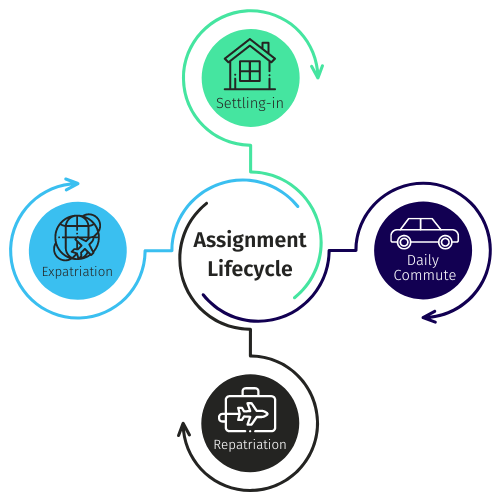Blog
GREATER SUSTAINABILITY IMPACT VIA A HOLISTIC RELOCATION STRATEGY
This article by Jesper Lovendahl, CEO & Founder of ExpatRide and Pavla Skorpilova, Sustainability Manager at ExpatRide is based on the White Paper "Driving Sustainability: The Case for Eco-Conscious Assignments in Global Mobility," which explores the industry challenges and opportunities holistically, focusing on the sustainable choices of employees on assignment.
Looking at global mobility holistically, prioritizing sustainability and environmental, social, and governance (ESG) considerations is becoming a legal imperative and a strategic advantage for forward-thinking organizations. Change is the essence of relocation, and despite people's tendency to fear it, there is a vast opportunity gap when a major change in life happens. Based on a research study conducted by Professor Bas Verplanken in 2016, it was concluded that individuals who relocate have much higher potential to acquire new habits than those who do not make such a move. These individuals are simply more open to learning and adopting more sustainable practices. (1)
What if we use this opportunity gap to plant a seed of sustainable actions throughout the relocation lifecycle and far beyond?

Global Mobility and its Potential for Decreasing the Carbon Footprint
Moving people and their belongings is necessary for assignees, and its impact on carbon emissions cannot be overlooked. Sustainability measures will become increasingly important to a growing number of stakeholders throughout organizations, with procurement departments being particularly affected when it comes to Scope 3 emissions, given that the majority of Scope 3 emissions are generated outside of the organization. According to the EcoVadis Sustainability Procurement Barometer 2024, almost 90% of leaders claim that Scope 3 reductions and net-zero targets are the top drivers of their sustainability programs. (2)
When we zoom in on Scope 3 emissions and the relevant supplier categories, it comes down to the logistics of moving the assignees and their belongings, housing, transportation, and fitting into the new community with the assistance of related service providers. However, Scope 3 emissions also include how the assignees live their lives on assignment and the choices they make. Despite the Global Mobility industry focusing on the initial move and the “big one-time events creating a substantial carbon footprint,” it is the small everyday activities that in the long run exceed the carbon footprint of the move or the flight.
Daily transportation and personal logistics also significantly contribute to the carbon footprint, with cars and vans alone emitting 48% of the total CO2 emissions from global transport, making them the largest contributor within the global transportation sector (3). This underscores the importance of private transport and individual responsibility while also presenting a substantial opportunity for facilitating change. Organizations can contribute to promoting more sustainable transportation choices within host countries by encouraging the use of public transportation systems, initiating carpooling programs, or providing incentives for adopting electric or hybrid vehicles. By prioritizing sustainable transportation throughout the relocation lifecycle, global mobility professionals and assignees can play a crucial role in mitigating the environmental impact of talent relocation and fostering a more sustainable future.
Case Study: Putting the Move into Perspective: How a More Sustainable Commute Can Offset a 40-foot Container MoveWith the help of an example, let us give more context on how a regular activity, such as car commuting, can be done more sustainably when on an international assignment. Can the switch from petrol-fueled cars to electric cars help make a difference in the whole assignment lifecycle? Assume a relocation of an assignee with his family from the US to the UK for a period of two years where the assignee is. Moving the family's household belongings back and forth will emit roughly 4.1 tones of CO₂e. The assignee must commute daily due to limited public transportation options. If the assignee drives 12,000 miles per year in a petrol car with an average consumption of 8 liters/100 km, the carbon footprint of his driving results in 7.5 tones of CO₂e over the two-year assignment. Choosing an electric car with an average consumption of 17 kWh/100 km saves about 80% of CO₂ emissions, with a total of 1.7t of CO₂e emitted. In other words, by driving an electric car on an assignment, 5.8t of CO₂ can be saved. Thereby "offsetting" more than the carbon footprint of the 40-foot container shipment. |
(For more context on the case study, read the White Paper)
A Collective Commitment to Sustainable Relocation
Sustainability is a journey. And the journey towards sustainable relocation practices requires a joint effort from all stakeholders involved. Each stakeholder - be it the relocating employee, the corporation, or the relocation consultant - has a role to play in this journey. By collaborating and committing to ongoing education to get a deeper understanding of the importance of sustainable choices, we must take the initiative and motivate the assignees to make informed decisions that align with sustainability goals.
It is time to shift our focus to a more comprehensive view of relocation, one that encompasses the entire relocation lifecycle. This includes pre-move planning, the physical move, settling in, but also long-term daily activities. Merely concentrating on the initial move underestimates the cumulative effect of everyday actions. Our daily habits and routines are deeply ingrained in our behavior, making it challenging to change their course. However, the initial months of relocation present a unique window for change. This opportunity should not be overlooked; instead, it should be harnessed through well-timed incentives and support systems that promote sustainable behavior from the start.
For those interested in a deeper dive into ExpatRide’s comprehensive White Paper, please read the full version here and join us on our journey toward a more sustainable future. And for more information on how Sirva is helping organizations navigate the journeys of their mobility programs to sustainability, please email us at concierge@sirva.com or reach out to your Sirva representative.
Learn more about Mobility’s impact on sustainability:
 |
 |
 |
| Navigating the Journey to Sustainability | A Deep Dive into Schneider Electric's Impactful ESG Initiatives | Global Mobility Cost Optimization |
| DOWNLOAD THE PAPER | LISTEN NOW | DOWNLOAD THE PAPER |

